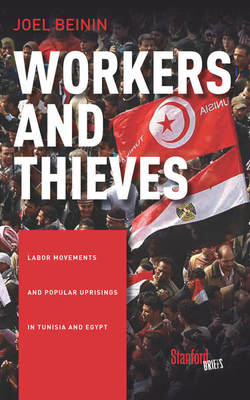Check out the introduction to Jadaliyya's new interview with Political Economy Project member Joel Beinin below. In the interview Joel discusses his recently published book entitled "Workers and Thieves: Labor Movements and Popular Uprisings in Tunisia and Egypt." To visit and read on Jadaliyya click here.

Joel Beinin, Workers and Thieves: Labor Movements and Popular Uprisings in Tunisia and Egypt. Stanford: Stanford University Press, 2015.
Jadaliyya (J): What made you write this book?
Joel Beinin (JB): I lived in Cairo for most of the time between September 2004 and December 2008. During this period, the wave of strikes and collective actions by Egyptian workers escalated dramatically. Workers invited me to visit factories and other workplaces where strikes were underway and asked that I write about what they were doing. So I began writing journalistic articles for Middle East Report, Le Monde Diplomatique, and similar outlets. I also wrote a report for the AFL-CIO Solidarity Center, The Struggle for Worker Rights in Egypt (2010, with research assistance from Marie Duboc, who was then my doctoral student).
After the ouster of former President Hosni Mubarak, I was well positioned to look back and assess the contribution of the workers movement to the formation of a culture of protest that ultimately delegitimized Mubarak. I didn’t have much residential or research experience in Tunisia. But it was very clear to me that a comparable—but also in important respects different—dynamic was at play in the ouster of former President Zine El Abidine Ben Ali. So I decided to combine and streamline my Egyptian articles, fill in some gaps, travel to Tunisia for two brief research trips, and write the book as a comparative study.
Jadaliyya (J): What made you write this book?
Joel Beinin (JB): I lived in Cairo for most of the time between September 2004 and December 2008. During this period, the wave of strikes and collective actions by Egyptian workers escalated dramatically. Workers invited me to visit factories and other workplaces where strikes were underway and asked that I write about what they were doing. So I began writing journalistic articles for Middle East Report, Le Monde Diplomatique, and similar outlets. I also wrote a report for the AFL-CIO Solidarity Center, The Struggle for Worker Rights in Egypt (2010, with research assistance from Marie Duboc, who was then my doctoral student).
After the ouster of former President Hosni Mubarak, I was well positioned to look back and assess the contribution of the workers movement to the formation of a culture of protest that ultimately delegitimized Mubarak. I didn’t have much residential or research experience in Tunisia. But it was very clear to me that a comparable—but also in important respects different—dynamic was at play in the ouster of former President Zine El Abidine Ben Ali. So I decided to combine and streamline my Egyptian articles, fill in some gaps, travel to Tunisia for two brief research trips, and write the book as a comparative study.
click here to continue reading
 RSS Feed
RSS Feed

